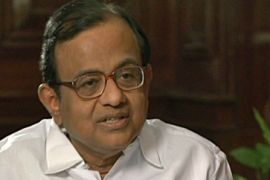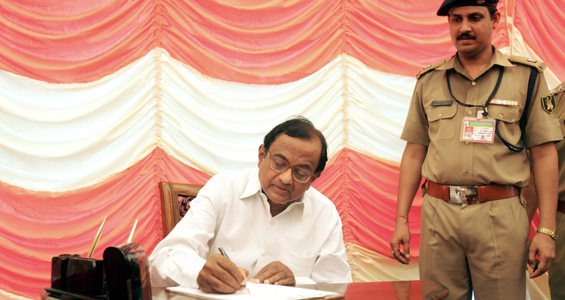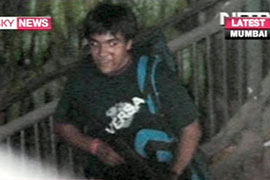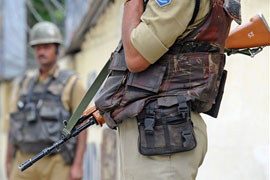Interview: P Chidambaram
India’s home affairs minister says Pakistan is stifling Mumbai attacks inquiry.


Chidambaram says he is unhappy with Pakistan’s investigations into the Mumbai attacks [EPA]
In an interview with Al Jazeera’s Hamish Macdonald, P Chidambaram, India’s minister of home affairs, says Pakistan is “deliberately” stifling the investigation into the attack on Mumbai in November last year.
Chidambaram said Pakistan was failing to follow up on the evidence provided to it by India linking the leader of the Lashkar-e-Taiba organisation with those who carried out the attacks.
During the interview, the minister produced documents detailing names, times and locations of alleged meetings involving Hafeez Sayeed, the Lashkar-e-Taiba chief, and the attackers. Pakistan has repeatedly refused to re-arrest Sayeed because it says India has failed to produce convincing evidence.
Click an interview topic to read P Chidambaram’s response: Dissatisfaction with Pakistan’s investigations into the Mumbai attacks
Dissatisfaction with Pakistan’s investigations into the Mumbai attacks Evidence submitted to Pakistan that implicates Lashkar-e-Taiba’s chief
Evidence submitted to Pakistan that implicates Lashkar-e-Taiba’s chief Engaging with Pakistan
Engaging with Pakistan Why Pakistan “worries” the Indian government
Why Pakistan “worries” the Indian government Border disputes with China
Border disputes with China India’s biggest internal security challenge
India’s biggest internal security challenge
| Dissatisfaction with Pakistani investigations |
| In video |
|
Watch P Chidambaram discuss the issues with |
Al Jazeera: So you have made it very clear that you are not satisfied with the response [from] Pakistan … to chasing down those responsible for plotting the Mumbai attacks. Why are you not satisfied?
P Chidambaram: Because they are not arresting the perpetrators of the Mumbai attacks. They are still on Pakistan soil. We know their names. We have shared their names with them. They are not investigating the case. The trial has not opened yet. It will be a year on the 26th of November. Therefore, we are thoroughly, totally dissatisfied with the Pakistani response.
Do you believe that they are deliberately holding up the investigation?
Yes. Regrettably that is the answer, but yes.
So the Pakistani government, the Pakistani authorities, let’s be clear about this, are deliberately stifling the investigation into the Mumbai attacks?
Yes.
Five individuals, militants, arrested in Pakistan, went before a court in Rawalpindi last weekend. Why is that not enough?
Where is the trial? Where is the charge sheet? When is a trial starting? When is the first witness being examined?
| Implicating Lashkar-e-Taiba |
You’ve handed over dossiers to the Pakistanis which you say include cogent and convincing evidence that links Lashkar-e-Taiba chief Hafeez Sayeed to the Mumbai attacks. What is that evidence then?
Well firstly I am a trained lawyer, so you’ll have to accept my word as against a non-lawyer’s word. The evidence that we have presented tells any investigator, any prosecutor what Hafeez Sayeed did, where he was, whom he met, what he told them, what his role was. If that is not evidence to continue [an] investigation against Hafeez Sayeed, what else is evidence?
But he was held and then released because the courts in Pakistan were not convinced that there was enough evidence?
The court can only be convinced if you present evidence… There is a vast distinction between the responsibility and role of the prosecution and the role and responsibility of the judge. The judge does not investigate. The judge weighs the evidence presented to the court. If no evidence is presented to the court, what will [the] judge do?
Why won’t you tell us what that evidence is though? Because at the moment we have the Indian authorities saying there is sufficient evidence, the Pakistani authorities saying it’s insufficient. What is the evidence? Where was he when the attacks were being planned?
| In depth |
|
|
December 2007 – January 2008 he was in a place where Kasab and others were trained. He spoke to the trainees on many occasions. There was another training camp at a place called Chekhalabandi mountain of Muzaffarabad. Hafeez Sayeed was in the camp and met the trainees.
He was accompanied by a person known as major general “saab” [sir].
Hafeez Sayeed finally selected the trainees and gave them new names. Kasab was given a new name – “Abu Mujahid” – that name was given by Hafeez Sayeed.
Then they underwent marine training at a training camp and Hafeez Sayeed was present for that training too.
On the 13th day of roza [Muslim fasting during Ramadan] the selected trainees were called to the office of the Bait-ul-Mujahideen and Hafeez Sayeed met them there. I could go on. Places, dates, names, conversations.
Now if a prosecutor is unwilling to take this as prima facie evidence, investigate further, visit the places, go to the places, arrest Hafeez Sayeed, and discover further evidence what does the prosecution of Pakistan do?
You mentioned a … major-general “saab”. Who is he?
I don’t know. All I know is there is a reference to a major-general “saab” who accompanied Hafeez Sayeed.
And you believe [him] to be a member of the Pakistani military?
I don’t know. Somebody must investigate that. You see, please let’s understand what investigation means. We can only give leads to our investigative agents.
That’s pretty concerning though … of a major general accompanying him?
He may be a retired major general, he may be a serving major general. I don’t know. That has to be investigated. So Hafeez Sayeed has to be asked where he was on those days, did he visit those places, who accompanied him. That is the purpose of investigation. In no crime, in no case [would] the accused or the culprit… come and tell the investigator “I did all these things”. Purpose of investigation is to take leads and investigate. That I am afraid the Pakistanis are not doing.
| Engaging with Pakistan |
At what level of the Pakistani leadership is this decision being taken not to pursue this information?
I wish I knew. How can I answer that question? All I know is that despite the promises made to India, that they will investigate these cases, go to the bottom of the truth and prosecute, they have not kept that promise.
This is part of the problem though isn’t it? You have decided not to continue sending your foreign minister to meet with Pakistan’s foreign minister as agreed at the Sharm-el-Shaikh conference earlier this year. You say you wish you knew, surely that’s the best way to find out?
Don’t mix up the things. We are only talking today about the Mumbai attacks. We are not talking about the larger foreign policy issue. If you wish to talk… foreign policy issues and what further steps to take, then that is a separate occasion and you should discuss this with the foreign minister.
But why not continue to engage with Pakistan if there is such crucial information that needs to be exchanged. Why not continue meeting with them?
We have said that any dialogue with Pakistan is dependent upon Pakistan prosecuting and punishing the perpetrators and dismantling the terror infrastructure. There is no evidence of either. So that is our position. Some may disagree with that position but that is the position of the Indian government.
But in Sharm el-Shaikh in July when all of this was discussed, the leaders of both countries agreed that the attacks on Mumbai should not be linked in any way or should not affect in any way the relationship between the two countries and as a display of that the foreign ministers of the two countries would meet as often as possible in the lead up to this month’s UN General Assembly. Now India has decided to stop sending its foreign minister. You can see why it is difficult for us to believe … that India is serious about engaging with Pakistan?
As I said, this discussion between you and me today is confined to the Mumbai attacks. I think you are turning the sentence of that statement on its head. The prime minister has clarified repeatedly, in parliament and outside, that [the] sentence does not mean what you say it does. What it means is that you cannot fail to carry out your obligation to punish the perpetrators … Pakistan cannot fail to carry out its obligation to punish the perpetrators by making talks [on] other issues a condition …. You have to go ahead and do what you promised to do.
But isn’t that just what you have done? Made those continuing talks a condition?
Of course we have. We have said it immediately after December 1. It is a condition, that you will punish the perpetrators of the Mumbai attacks. That has been our position since December. Sharm el-Shaikh will not change that position. Although that statement is being interpreted the other way.
The interior minister of Pakistan, your equal on that side of the border, has been quoted as saying that “Mumbai was an intelligence failure and if Mumbai police had shared the intelligence with them, they would have been able to prevent it”.
If we had the intelligence about an attack before [it] took place, we would have prevented that attack. There was a failure of intelligence at some level in India, I have admitted that already. But we are not talking about that. We are talking about post-Mumbai attack. Pakistan promised to prosecute and punish the perpetrators. Has it done so? The answer is no. Should they do so? The answer is yes.
| Why Pakistan “worries” India |
You are about to depart for Washington this week. An aide of President [Barach] Obama has been quoted as saying that “Pakistan scares him”. Does Pakistan scare you? Does it scare the Indian government?
No. Pakistan doesn’t scare us. Pakistan worries us. We want a stable government in Pakistan. There is considerable instability in Pakistan. We want Pakistan to behave like a responsible nation. Their behaviour does not inspire confidence. It doesn’t scare us, it worries us.
 |
| Indian officials say there were 10 attackers involved in the November 2008 assault [AFP] |
The Pakistani Observer on September 2 said that India is unfortunately as non-serious, adamant and insincere to resolve the Kashmir and other outstanding issues with Pakistan today as it was in the past. How do you respond to views like that?
These views are expressed from time to time. There is a lot of history to the Kashmir problem. I am not going to be able to explain it in a short interview. The point is that elections have been held in Kashmir. There is a government in place. There is a young chief minister. They are focused on bringing development to the people of Kashmir. And we think that we will succeed in bringing development to the people of Jammu and Kashmir. Pakistan wishes to raise old issues, they are welcome to raise them. But that will not deter us from bringing development to Jammu and Kashmir.
The tension between India and Pakistan captures so much of the world’s attention. Is the border issue between these two countries the biggest border issue for India today? It’s pretty clear that China must be, in your mind, a much bigger issue?
What is this border issue? There is a Line of Control. We respect the Line of Control. Pakistan does not. We do not infiltrate any terrorists or militants into either Pakistan-occupied territory or Pakistan. On the contrary, Pakistan sends every day, even as we speak, trained militants into the Kashmir valley.
You don’t support fighters in Baluchistan?
Of course not. Is anyone seriously suggesting that we have the desire or the capacity to send the infiltrators into Baluchistan?
No I’m asking if you support, not send your own … fighters there in any way?
As I said, Baluchistan is a problem for Pakistan to resolve. It’s an internal problem for Pakistan. The point is, since you raised the issue of Kashmir and the border, if Pakistan respects the Line of Control, we will deal with the border issue later. Let Pakistan first learn to respect the Line of Control. Stop infiltrating militants into the Kashmir valley, into India and let there be peace on that line of control and then there can be peace on that land.
| Border disputes with China |
I want to ask you about border issues though because it’s part of your area as home affairs minister. You have the world’s biggest disputed land border with China. Is that not a bigger concern, not a bigger potential threat?
Well it is a problem that has to be resolved, that will be resolved in due course. For the present, there are two special representatives who talk from time to time. We have talks with the SR of China only about a month ago. But while that border is indeed an issue that has to be resolved, there is no infiltration [of] militants across the border. There is no shooting on that border.
What do you think Chinese helicopters have [been] doing then in recent months, dropping out-of-date frozen pork products into parts of Kashmir?
The defence ministry and ministry of external affairs have explained that. Those reports are largely exaggerated.
The Indian army chief, [General] Deepak Kapoor did say that “there had been several violations … it could have happened due to navigational error but that does not justify it”. What’s going on there?
I think he captured the position correctly. It is a disputed border. There could be navigational errors. What we think are violations have taken place and these are resolved by talking to each other. But please remember that the India-China border is not the same as the LOC between India and Pakistan, where infiltration takes place, violence takes place. My concern at least as home minister [is] … about infiltration … about violence. Our concern [is] about nabbing infiltrators and militants. That’s my immediate concern.
So even though China is increasing its nuclear submarine arsenal in the Indian Ocean, you are also deploying extra forces along the Chinese border, you’re telling me that Pakistan is still a much bigger concern than the Chinese border issue?
I don’t think the two are comparable. [At] the ministry for home affairs, we are concerned about internal security. If you want to discuss matters of foreign policy and external security, we can discuss that but that is not the subject of today’s discussion.
| India’s biggest internal security challenge |
| In-dePTH | ||
|
Let’s stick with internal security in that case. Back in August you addressed chief ministers from all of the states. You stated that there are three challenges really that India is facing at the moment. Firstly terrorism, secondly insurgency in the north-east states and thirdly left-wing extremism or Naxalism. In the lead up to the Commonwealth Games, due to be held here next year, how big a factor is the concern about the Maoist insurgents posing a threat to the staging of the games?
None. The Commonwealth Games will be held in Delhi. And full and fool-proof security will be provided … Naxalites will not and cannot do anything to disrupt the games.
You quoted though in that speech the prime minster who said on a number of occasions that the single biggest internal security challenge to India is the Naxalites?
… That’s true.
Is it bigger than the threat from home-grown [groups] or individuals here that are in some way supported by Pakistan?
See, the Naxalites operate largely around seven states. That’s where they have influence. So that’s a problem that has to be dealt with in those states. Where as terrorism is more capable of spreading anywhere in India. If you have home-grown terrorists, supported by Pakistan, they can theoretically strike in any part of India. So I think the two are not comparable, that’s why I said the response to each of these threats, while they will have some commonalities, … the response will be totally different.
How serious are you though about eradicating the problem caused by the Naxalites? There are 230,000-plus police posts that are vacant in India. I mean if you’re seriously going to tackle this issue, you need to have enough police on the streets?
 |
| Chidambaram said India had underestimated the menace of Naxalism over the years [AFP] |
You are saying what I told the chief ministers. I recognise that we underestimated over the last five to 10 years the menace of Naxalism. In this period, they have grown, they have recruited, and they have acquired more arms and weapons. Therefore, the states now are in overdrive to fill the vacancies. As we speak, I know that they are recruiting, training about 85,000 people. There is still a gap and I have told them that this should be completed by the March 31, 2010. I hope they will heed that advice. I know that we have to do a bit of catching up but that’s precisely what I have told them both in January 2009 in the first conference and August 2009 in the second conference. We are very serious.
You said that “the states have allowed themselves to bend before insurgent groups”. Do you think the states are failing?
That is in context of the North-East state insurgencies. I said some states have allowed themselves to bend before the insurgent groups which indulge in rampant extortion. That is a very different problem.
On both of these fronts do you think the states are failing you? I mean you’ve got a pretty clear direction as to how this should be dealt with?
The seven states affected by Naxalism are on board. They are on the same page as the central government. We have jointly resolved that we will jointly, collectively fight the Naxalites.
Well do you think that this issue has a long time left to run? How long is it going to take India to deal with Maoists?
Oh, it will take some time. They have entrenched themselves in certain parts of India. It will take some time. But we will prevail.
It’s a problem that seems to have a constant presence in Indian life?
It is. In fact, it is I who first said that we have underestimated the problem. It is the prime minister who first said that it is the most serious threat to internal security in terms of its spread and intensity. But we will tackle this menace and we will overcome the challenge.
How much territory do the Naxalites actually control?
There are pockets in seven states. In Chhattisgarh, Jharkhand it is very large number of districts. But in Orissa, Bihar, Maharashtra, the numbers are smaller. It’s not the whole states. It is many districts in the states.

